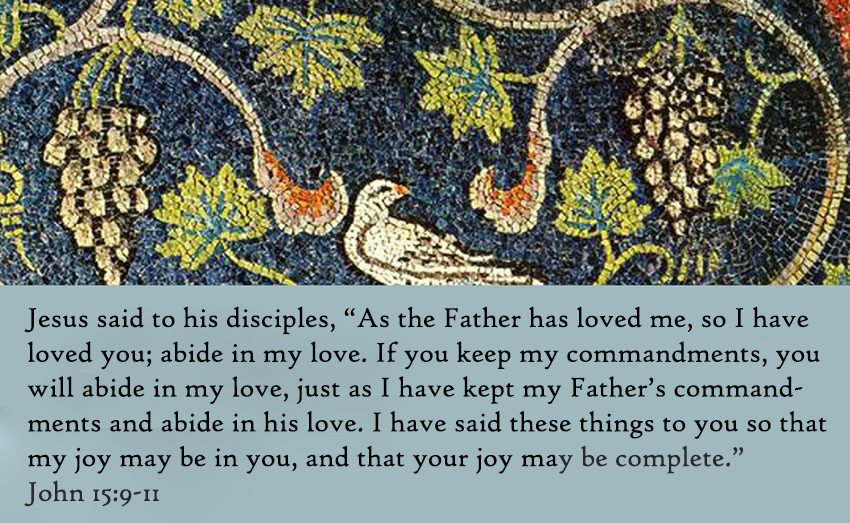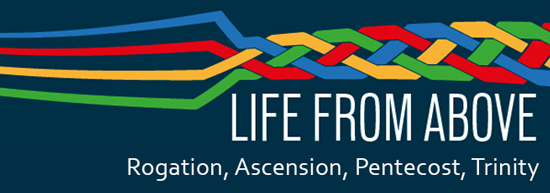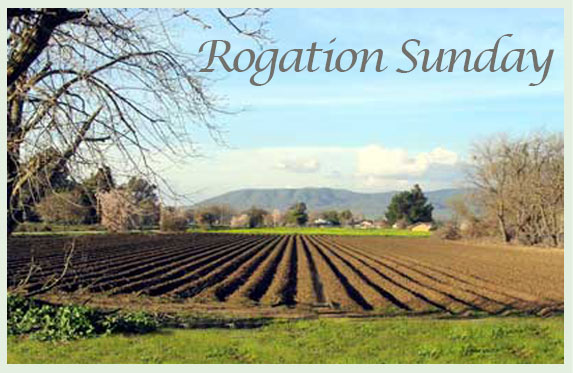Easter 6, May 5, 11am
Lector: Andrea Pogue
Chalice Bearer: Alice Hughes
Altar Clean up: Andrea Pogue
St. Peter's Episcopal Church, Port Royal, VA

We are a small Episcopal Church on the banks of the Rappahannock in Port Royal, Virginia. We acknowledge that we gather on the traditional land of the first people of Port Royal, the Nandtaughtacund, and we respect and honor with gratitude the land itself, the legacy of the ancestors, and the life of the Rappahannock Tribe. Our mission statement is to do God’s Will in all that we do.
Easter 6, May 5, 11am
 Photos
Photos
 Videos
Videos
 Bulletin
Bulletin
 Sermon
Sermon
 “Friendship Is at the Heart of the Gospel”>
“Friendship Is at the Heart of the Gospel”>
 Rogation hymns
Rogation hymns
 Julian of Norwich, May 8
Julian of Norwich, May 8
 ECM Maintenance, May 11
ECM Maintenance, May 11
 May newsletter
May newsletter

Last week I said that in the sermons I get to share with you before I leave, I want to consider what the scriptures appointed for each Sunday have to say to this parish in this time of transition.
Today’s gospel passage completes the gospel from last Sunday, in which Jesus tells the disciples that God is the gardener, Jesus is the vine, and we are the branches. Jesus reminds the disciples that God the gardener must prune the branches to make them bear more fruit, and that we, here at St Peter’s, are going through a pruning with all the changes ahead. But the promise is that since Jesus the vine to which we branches are attached, we can count on bearing more fruit because God the gardener has pruned us.
As Jesus continues this conversation with the disciples, he moves from a focus on pruning the branches to a focus on the disciples abiding in his love. This focus on abiding in his love is where we begin today’s considerations about the parish transition ahead of us.

Rogation Sunday is the day when the Church has traditionally offered prayer for God’s blessings on the fruits of the earth and the labors of those who produce our food
Our hymns today reflect the themes of Rogation Sunday. Here are two examples:
1. “Not here for high and holy things”
Geoffrey Anketel Suddert-Kennedy, 1883-1929
First three verses
Not here for high and holy things
we render thanks to thee,
but for the common things of earth,
the purple pageantry
of dawning and of dying days,
the splendor of the sea,
the royal robes of autumn moors,
the golden gates of spring,
the velvet of soft summer nights,
the silver glistering
of all the million million stars,
the silent song they sing,
of faith and hope and love undimmed,
undying still through death,
the resurrection of the world,
what time there comes the breath
of dawn that rustles through the trees,
and that clear voice that saith:
This list of “common things” is so long that it occupies three full stanzas of the hymn, culminating in that tantalizing “that clear voice that saith:”.
The remaining verses – continue this – the lark in the sky, giant sun soars up,
The last verse focuses on God
“to serve right gloriously the God who gave all worlds that are,
and all that are to be.
Notes
Service was affected by the absent of our organist whose car broke down on the way to church. Hymns had to be rearranged with Catherine filling in on keyboards.
Sermon was a continuation of the previous Sunday dealing with transition. The metaphor shift from the Vine to abiding in Love all from the Gospel of John.
Attendance of 20 was affected by parishioners traveling.
00 In honor of Cornelius
01 Opening Hymn – “We have come into His house”
02 Hymn of Praise – “For the beauty of the earth”
03 Readings
Click here to view in a new window.
Click here to view in a new window.
I.Theme – A Community characterized by love

"The Endless Road" – Margret Hofheinz-Doring (1971)
The lectionary readings are here or individually:
First Reading – Acts 10:44-48
Psalm – Psalm 98 Page 727, BCP
Epistle –1 John 5:1-6
Gospel – John 15:9-17
Today’s readings urge believers to come together in a community characterized by love. In his sermon, Peter tells Cornelius of God’s work in Jesus Christ, thus opening the doors of the Church to Gentiles. The author of 1 John describes Jesus as God’s love for us, and calls us to embrace one another in that love. In the gospel, Jesus tells his disciples that they have been chosen to love one another; in this they will find perfect joy.
The great commandment, love God and your neighbor, transforms everything we do. While we cannot describe the specifics of love, because love is always highly situational and concrete, a commitment to loving actions and attitudes is at the heart of our relationship with God and all creation. Love embeds us in the fabric of relatedness, opening us to the creative energy of the universe and enabling us to become channels to others of the divine energy we have received.
Acts 10:44-48 This missionary speech in today’s reading marks an important turning point in the outreach of the early Church. Many Jewish Christians feared and resisted the possible inclusion of Gentiles, but Luke makes clear that Peter himself (even before Paul) began the mission to the Gentiles under the direction of the Holy Spirit.
Cornelius was a “God-fearing” Roman, one who worshiped God but had not adopted all of the Jewish religious practices. Cornelius receives the sacrament of baptism, but not before he and his gathered household receive the gift of the Holy Spirit. This event marks a new Pentecost. The circle of Christian faith has now broadened to include the inhabitants of “the ends of the earth” (1:8). The Spirit first came to Jews (2:1-4), then to the despised Samaritans (8:14-17), and now to the Gentiles.
Psalm 98 This psalm is closely related to Psalm 96. Its original setting may have been the enthronement festival of Yahweh, celebrated each year at the New Year’s feast of Tabernacles. In later times the psalm was interpreted to herald the lord’s final coming. It presents the lord, in faithfulness to the covenant, acting in history for the salvation of God’s people.
1 John 5:1-6 The writing of 1 John seems to have been occasioned by a schism in the community due to heresy, specifically the denial of Jesus’ humanity. The central theme of 1 John is that “God is love” (4:8). The significance of this statement is explored through repeated meditation that interweaves theology and ethics. Those who make the early baptismal confession, “Jesus is the Christ,” have assented to a pattern for their behavior. As God’s children, Christians are to love God and one another and to obey the commandments. Through trust in Jesus, the Christian may overcome the world.
John 15:9-17 Believers are to love one another with a love characterized by self-sacrifice. Thus while Christians are still "servants" (v. 15, literally “slaves”) of Christ in terms of ministry (see 12:26; 13:14-16), they are "friends" (v. 15) of Christ in terms of intimacy with God. In and through this relationship Christians are appointed to "bear fruit" (v. 16).

In our scripture reading for Sunday, Jesus makes a bold pronouncement: “I have called you friends.” Here, Jesus makes a claim of intimacy with his followers. Those who love him are not indebted to him or under his thumb, rather Jesus invites us into a mutual relationship, one that will “bear fruit that will last.”
But what does this mean? Since Jesus is God incarnate in the world, we might wonder how we, mere humans, can be in a mutual relationship with the God of the universe, who knows and see all things.
In the Hebrew scriptures, God calls Abraham, the father of our faith, “my friend” (Isaiah 41:8). Like all healthy friendships, though, Abraham’s relationship with God has its ups and downs. Abraham has to wait a long time for his prayers to be answered (Genesis 12–21), he has to have faith even when God’s commands seem paradoxical, and he even negotiates with God (Genesis 18), asking God to change God’s mind. This is a real relationship, forged in real time — a friendship suffused with both tenderness and obligation.

1 From the SALT blog for May 5, 2024 – Following directly on last week’s passage in which Jesus casts himself as “the vine” and the disciples as the vine’s fruitful branches, here Jesus elaborates on just what sort of “fruit” he has in mind: works of love for the sake of joy.
Here Jesus elaborates on just what sort of “fruit” he has in mind: works of love for the sake of joy.
2 The key to understanding the “farewell discourse” in John (John 14-17) is to remember that Jesus is engaged here in urgent pastoral care, assuring his distraught disciples that his imminent departure is not abandonment, but rather a move that will make way for an even deeper intimacy. Accordingly, the exhortations in this week’s passage (“love one another”) are expressions of care and reassurance. Hearing Jesus this way shifts the tone from mere imperative (“you must go and do such-and-such”) to warm encouragement and consolation (“take heart, I’m not abandoning you — as you go and do such-and-such, we’ll be together!”).
Click here to view in a new window.

Four Sundays of May commemorating agriculture, the Ascension, Pentecost and Trinity Sunday – are four feasts of great importance in the life of the Church. They are distinctively “named” Sundays.
Rogation Sunday on May 5 (Easter 6) goes back to prayer and fasting in early Christian times for protection for crops from disease. It was also a reflection of the Roman holiday of Robigalia at which a dog was sacrificed to propitiate Robigus, the god of agricultural disease. In England they were associated with the blessing of the fields at planting. The vicar “beat the bounds” of the parish, processing around the fields reciting psalms and the litany. In Christian years it involved fasting and abstinence in preparation for celebrating the Ascension. Traditionally, Rogation days are the three days before Ascension Day on which the litany is sung (or recited) in procession as an act of intercession.
The Ascension (May 9, celebrated May 12) is usually described as marking the completion of Jesus’ ministry on earth as he returned to Heaven. But it is far more than that. It marks the exact moment when Jesus, Son of God, commissioned his disciples to begin the gigantic task of converting the whole world. As recorded in St Mark’s Gospel, Jesus said: “Go into all the world and proclaim the good news to the whole creation. The one who believes and is baptized will be saved; but the one who does not believe will be condemned.”
Luke tells us that Pentecost (May 19) occurred a short time after the Ascension, and marked the fulfillment of Jesus’ promise, at his Ascension, to send the Holy Spirit on the disciples.
The gift of the Holy Spirit electrified these fearful followers – who only weeks before had run away when Jesus was arrested, and were still hiding for fear of those who had been responsible for their Lord’s death – and transformed them into men and women willing to lay down their lives for their faith, as many of them did.
The feast of Holy Trinity (celebrated May 26), though logically linked with the other two, was established much later. Although its existence was clearly stated in the New Testament, and early recognized as a doctrine of the faith, it was only when the Arian heresy – which denied Jesus was God – was spreading in the fourth century, that the church Fathers prepared an Office with canticles, responses, a preface, and hymns, to be recited at Mass. From these, the feast we now celebrate as Trinity Sunday gradually evolved.
Together, these latter three great feasts mark the promise which Jesus gave to his disciples, and its fulfilment in the Church on earth. As recorded by Matthew, the very last words Jesus said to his Apostles before going up to Heaven, were: “Go therefore and make disciples of all nations, baptizing them in the name of the Father and of the Son and of the Holy Spirit, and teaching them to obey everything that I have commanded you. And remember, I am with you always, to the end of time.”

Rogation Sunday, a time of celebration and prayer, is a time set aside to appreciate and recognize our dependence upon the land for our food and most importantly upon our dependence of God for the miracles of sprouting seeds, growing plants, and maturing harvest.
The Rogation Days, the Monday, Tuesday, and Wednesday before Ascension Day, originated in Vienne, Francein 470 after a series of natural disasters had caused much suffering among the people. Originally, the Christian observance of Rogation was taken over from Graeco-Roman religion, where an annual procession invoked divine favour to protect crops against mildew. Archbishop Mamertus proclaimed a fast and ordered that special litanies and prayers be said as the population processed around their fields, asking God’s protection and blessing on the crops that were just beginning to sprout.
The Latin word rogare means “to ask”, thus these were “rogation” processions. The tradition grew of using processional litanies, often around the parish boundaries, for the blessing of the land. These processions concluded with a mass. The Rogation procession was suppressed at the Reformation, but it was restored in 1559. The poet George Herbert interpreted the procession as a means of asking for God’s blessing on the land, of preserving boundaries, of encouraging fellowship between neighbours with the reconciling of differences, and of charitable giving to the poor. The tradition of ‘beating the bounds’ has been preserved in some communities. In the latter a group of old and young members of the community would walk the boundaries of the parish, usually led by the parish priest and church officials, to share the knowledge of where they lay, and to pray for protection and blessings for the lands. Others maintain the traditional use of the Litany within worship. In more recent times, the scope of Rogation has been widened to include petition for the world of work and for accountable stewardship, and prayer for local communities, whether rural or urban.
The Sunday before the Rogation Days came to be considered a part of Rogationtide (or “Rogantide”) and was known as Rogation Sunday. The Gospel formerly appointed for that day was from John 16, where Jesus tells his disciples to ask, and ye shall receive.
At St. Peter’s we have used this occasion to plant trees, “beat the bounds” by reviewing our property condition, pray for rain and to ask God to bless us with a good harvest later in the year.
These were taken over several rogation years from 2014

She is the author of the Braiding Sweetgrass. From Bookshop.org “As a member of the Citizen Potawatomi Nation, she embraces the notion that plants and animals are our oldest teachers. In Braiding Sweetgrass, Kimmerer brings these two lenses of knowledge together to take us on “a journey that is every bit as mythic as it is scientific, as sacred as it is historical, as clever as it is wise” (Elizabeth Gilbert).
“Drawing on her life as an indigenous scientist, and as a woman, Kimmerer shows how other living beings–asters and goldenrod, strawberries and squash, salamanders, algae, and sweetgrass–offer us gifts and lessons, even if we’ve forgotten how to hear their voices. In reflections that range from the creation of Turtle Island to the forces that threaten its flourishing today, she circles toward a central argument: that the awakening of ecological consciousness requires the acknowledgment and celebration of our reciprocal relationship with the rest of the living world. For only when we can hear the languages of other beings will we be capable of understanding the generosity of the earth, and learn to give our own gifts in return. “
Smithsonian in the May, 2015 issue writes about a new trend in planned living involving farm life. Housing is connected not to golf courses or lakes but to gardens.and farm land. Interconnectively is the key concept. In some developments, apartments and homes are wedged together to make use of limited space and encourage social interaction.
There are already dozens of agritopian developments and, fueled by the local-food movement. There is highly planned housing together with an environmental focus . Waste water, for example is filtered in a biological treatment system and reused for irrigation. There as much focus on providing bike and hiking paths as streets. Parks become common meeting grounds.

Serenbe is perhaps the country’s most popular and profitable “agritopia,” outside Atlanta. It tries to combine what it would term the “good life.” – arts, agriculture, education.
At Serenbe, there is a 25-acre organic farm. Plus there farmlands all of which produce enougth vegetables to supply a number of restaurants, a farmers’ market and a Community-Supported Agriculture program
Their website provides an attractive description “Year-round cultural events include outdoor theater from Serenbe Playhouse, culinary workshops and festivals, music events, films and lectures, boutique shopping, art galleries, a spa and trail riding, plus a robust Artist in Residence program featuring dinners and talks. “ Currently there are 400 homes
Links 1. Serenbe 2. Smithsonian article

Just in time for Rogation Sunday!
In 2021, TED Countdown launched a partnership with Fine Acts – a global creative studio for social impact – to kick off a series of SPRINTS, creative boot camps held at TEDx events worldwide.
The goal: Engage artists to envision a better future. In three years, this extraordinary collaboration has produced hundreds of inspiring works for The Climate Collection – a unique vault of open-license visuals.
They are here
Based on information discussed at the February CERVE meeting regarding the need for snacks at the elementary schools in Caroline County, St Peter’s Vestry made a donation, along with many other churches, to raise $1268 to be spent on snacks for the three schools. Teachers at these schools have been individually providing snacks for their classrooms since many of the children cannot afford to bring a daily snack to school.
One of the CERVE members coordinated with personnel at the three county elementary schools, getting input about what snacks would be wanted. She then purchased juice boxes, fruit cups, apple sought and other healthy snacks and delivered snacks to the three schools. With the donations received, the schools will receive snacks through the rest of this school year. Needless to say, everyone is extremely grateful for this direct help for our Caroline County children.